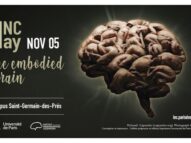événements, rencontres INC
12 Janvier 2021 – Première rencontre du Club Autisme, autres troubles du neurodéveloppement et Vision (CAV)
Le CAV est soutenu par le GIS Autisme et autres TND et par l’INC. Son comité d’organisation est composé de Cendra Agulhon et Marie Piéron (coordinatrices), Sylvie Chokron, Klara Kovarski et Sylvie Tordjman.
Programme
Continue reading
faits
Le Club Autisme, autres troubles du neurodéveloppement et Vision – CAV
Les troubles du spectre de l’autisme (TSA) sont caractérisés par une dyade de symptômes : troubles des interactions sociales et de la communication, intérêts restreints et comportements stéréotypés. Outre ces symptômes, des particularités sensorielles sont très fréquemment observées. Elles concernent tous… Continue reading
événements, séminaires
6 Novembre 2020 – Stéphane Dieudonné (ENS, Paris) – A sequential strategy for multi photon actuation and recording of membrane voltage in awake animals
Technologies for recording and manipulating neuronal membrane potential in vivo in defined neuronal populations with high fidelity will be essential to understand how information is represented, processed, and propagated in the brain. Genetically encoded voltage indicators and optogenetic actuators are… Continue reading
événements, rencontres INC
5 Novembre 2020 – INC DAY 2020: The Embodied Brain (Le cerveau incarné)
Cette année, l’INC DAY examinera de multiples aspects des relations entre corps et cerveau, de la nutrition aux hormones et à la cognition incarnée. Après la conférence inaugurale de Catherine Tallon-Baudry (Ecole Normale Supérieure, Paris) sur le thème Viscerally conscious,… Continue reading
événements, séminaires
16 Octobre 2020 – Philippe Faure (IBPS, Paris) – Exploratory behavior, individual trait and nicotine addiction: the role of dopamine
Consistent individual differences in behaviours represent an ubiquitous feature in animal populations. These behavioural differences among individuals define personality and have been linked to the susceptibility to addiction. Indeed, the susceptibility to develop drug addiction differs substantially between individuals and some traits that characterize an individual,… Continue reading
événements, séminaires, vidéos
9 Octobre 2020 – Gregory Gauvain (Institut de la Vision, Paris) – Optogenetics for vision restoration: toward clinical trials
Using vector and genetic constructs most suitable for vision restoration in patients with retinopathies, we have demonstrated temporal resolution compatible with highly dynamic visual scenes and a visual acuity above legal blindness.
Captation et conception vidéo: Service audiovisuel de Paris Descartes.
Video sur MédiasD
Continue reading
événements, séminaires, vidéos
2 Octobre 2020 – Bassem Hassan (ICM, Paris) – The neuroscience of why flies are people
The genome versus experience dichotomy has dominated understanding of behavioral individuality. By contrast, the role of nonheritable noise during brain development in behavioral variation is understudied. Using Drosophila melanogaster, we demonstrate a link between stochastic variation in brain wiring and… Continue reading
événements, séminaires, vidéos
25 Septembre 2020 – Caroline Rouaux (Inserm U1118, Université de Strasbourg, France) – Evaluation of the corticofugal hypothesis in ALS
Amyotrophic lateral sclerosis (ALS) is the third most frequent neurodegenerative disease after Alzheimer’s and Parkinson’s diseases, and the most frequent disease of the adult motoneuron. Clinically and histopathologically, ALS is defined as the simultaneous degeneration of corticospinal neurons (CSN) in… Continue reading
événements, séminaires
Programme des séminaires 2020
Les vendredi à 11h30 en salle de conférence R229
17/01 Martin Giurfa (Centre de Recherche, Université de Toulouse, France)24/01 Naguib Mechawar (Université McGill, Human brain bank, Canada)07/02 Ruben Portugues (Institut Max Planck de Neurobiologie, Martinsried, Allemagne)25/09 Caroline… Continue reading
événements, séminaires
6 Mars 2020 – Peter Hagoort (MPI for Psycholinguistics, Radboud University, Nimègue) – The listening and speaking brain
The infrastructure of the human brain allows us to acquire a language without formal instruction in the first years of life. I will discuss the features that make our brain language-ready. Next to the neuro-architectural features I will discuss the… Continue reading


